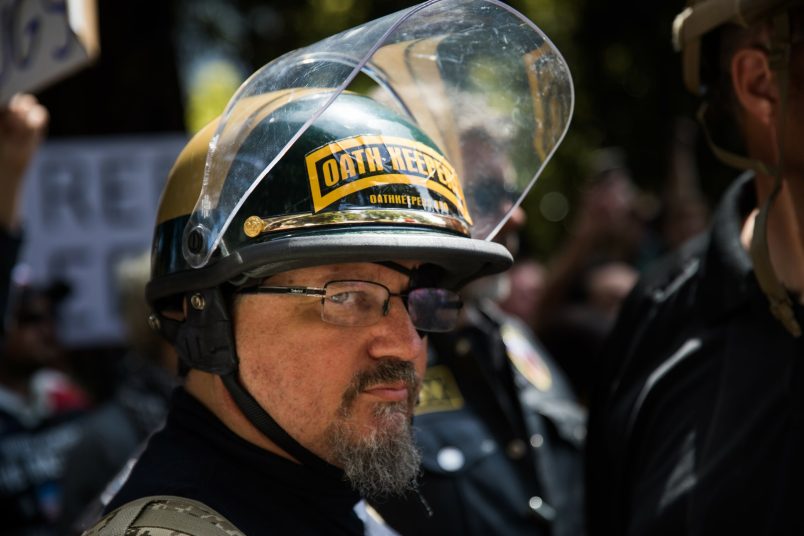Federal prosecutors have alleged that on the day of the Jan. 6 insurrection, Stewart Rhodes, the leader of the far-right Oath Keepers militia group, communicated with the members and affiliates of the group who have been charged with plotting to attack the Capitol that day.
In a court document filed late Monday that opposed the reconsideration of alleged Oath Keeper Thomas Caldwell’s detention, prosecutors alleged that a chat group in which Rhodes posted frequently was used to plan for, and then carry out, the use of force on Jan. 6.
In the run-up to the attack, Rhodes, identified as “Person One” in the filing, warned alleged conspirators who were at the Capitol in a group chat, “DO NOT bring in anything that can get you arrested. Leave that outside DC,” prosecutors said. (Rhodes has not been charged with a crime.)
“We will have several well equipped QRFs [Quick Reaction Forces] outside DC. And there are many, many others, from other groups, who will be watching and waiting on the outside in case of worst case scenarios,” he also allegedly texted.
Rhodes also discussed body armor and weaponry in the chat, prosecutors said.
“Collapsible Batons are a grey area in the law,” he allegedly wrote. “I bring one. But I am willing to take that risk because I love em. Good hard globes, eye pro, helmet. In a pinch you can grab Mechanix gloves and a batters helmet from Walmart.”
On the day of the attack itself, prosecutors alleged that the chat group “was activating a plan to use force on January 6.”
At 1:38 p.m, around 20 minutes after then-President Trump had concluded his remarks at a rally that incited the crowd of his supporters, Rhodes allegedly wrote: “All I see Trump doing is complaining. I see no intent by him to do anything. So the patriots are taking it into their own hands. They’ve had enough.”
Twenty-six minutes later, Rhodes allegedly sent photos of the southeast side of the Capitol building and directed the group to come to the steps. “Patriots pounding on the doors,” he allegedly captioned one photo.
Within seven minutes, authorities alleged, Caldwell wrote to his Facebook contacts, “We are surging forward. Doors breached.”
A few hours later, as many rioters were leaving the Capitol Building, prosecutors alleged that a large group including several co-defendant “gathered around Person One and stood around waiting for at least ten minutes in that location.”
The messages show prosecutors’ focus on Rhodes, a high-profile figure in the militia movement who so far has mostly stayed out of court documents related to the Capitol attack.
The text messages — as well as one message Rhodes allegedly posted on the Oath Keepers website two days before the breach urging members to prepare to “honor our oaths” — show that “the co-conspirators joined together to stop Congress’ certification of the Electoral College vote, and they were prepared to use violence, if necessary, to effect this purpose,” prosecutors wrote.
Caldwell, who prosecutors claim was part of a large group of alleged Oath Keepers that conspired to attack the Capitol, has denied he is a member of the militia group and also that he entered the Capitol building.
But prosecutors have quoted alleged communications between him and others on Jan. 6 narrating the breach of the Capitol. He allegedly messaged a friend, “we started stealing the cops riot shields and throwing fire extinguishers through windows. It was a great time.”
“The evidence of Defendant Caldwell’s role and intent in planning this offense comes from his own words,” prosecutors wrote in the new filing.
For his part, Rhodes had been referenced in court filings before, but only obliquely, and under the label “Person 1.”
For example, in an early February filing in support of conspiracy charges against four Oath Keepers, prosecutors cited a Jan. 4 email allegedly written by Rhodes. “As we have done on all recent DC Ops, we will also have well armed and equipped QRF teams on standby, outside DC, in the event of a worst case scenario, where the President calls us up as part of the militia to to [sic] assist him inside DC,” he wrote, according to prosecutors.
Three days prior, in an alleged Jan. 1 message quoted by prosecutors, Caldwell even appeared to express frustration with Rhodes.
“I don’t know if Stewie has even gotten out his call to arms but it’s a little friggin late,” he allegedly wrote in a Facebook message. “This is one we are doing on our own.”



